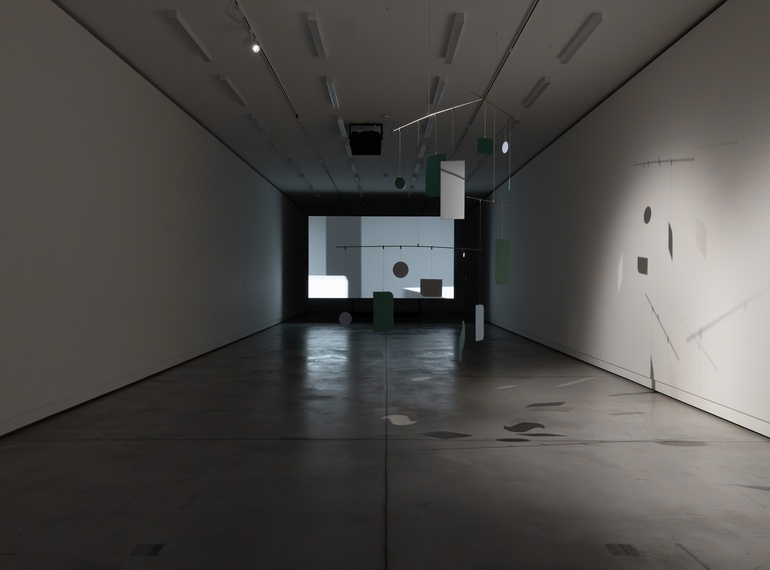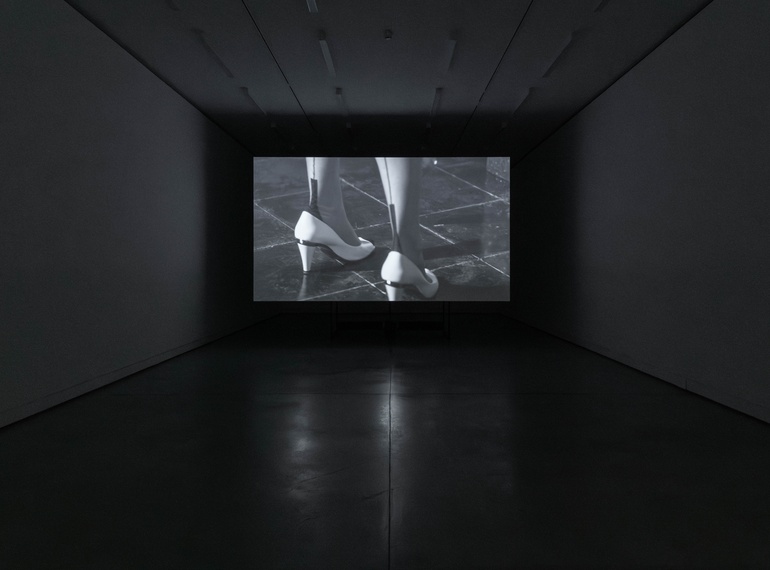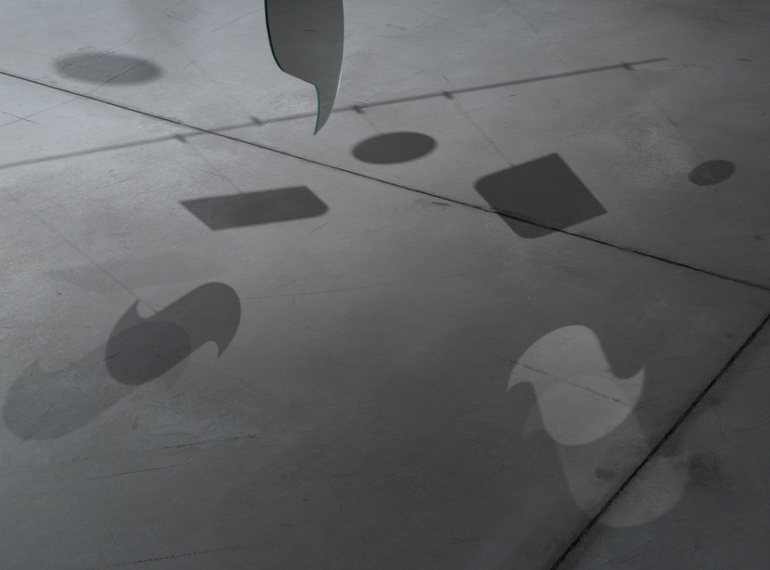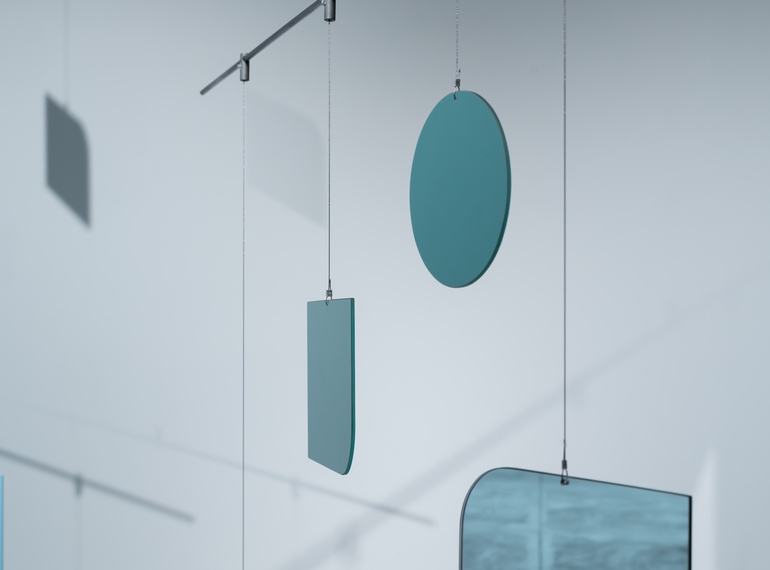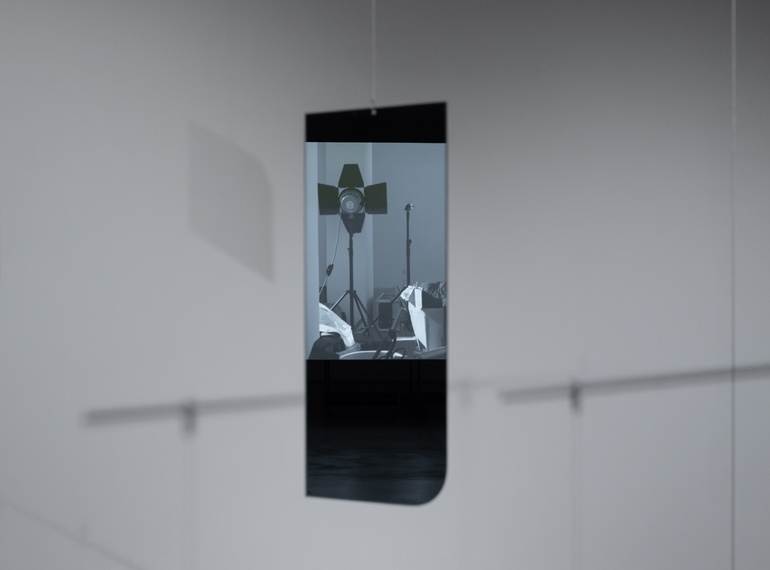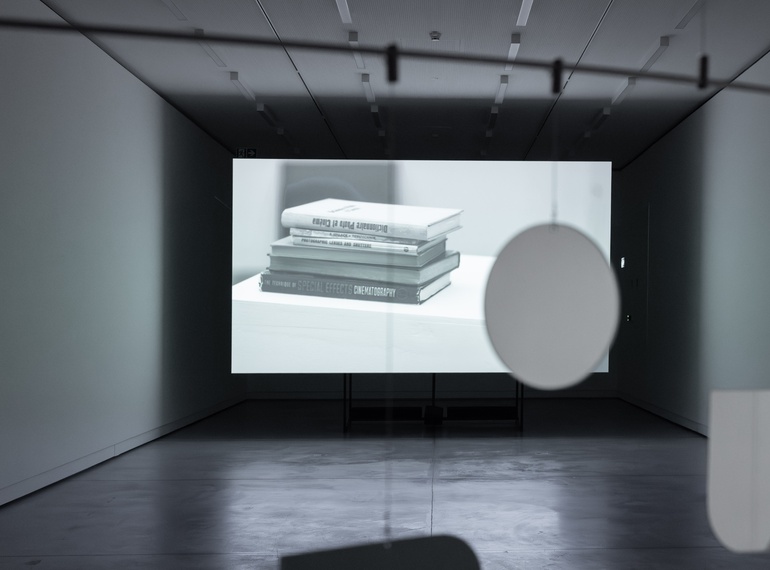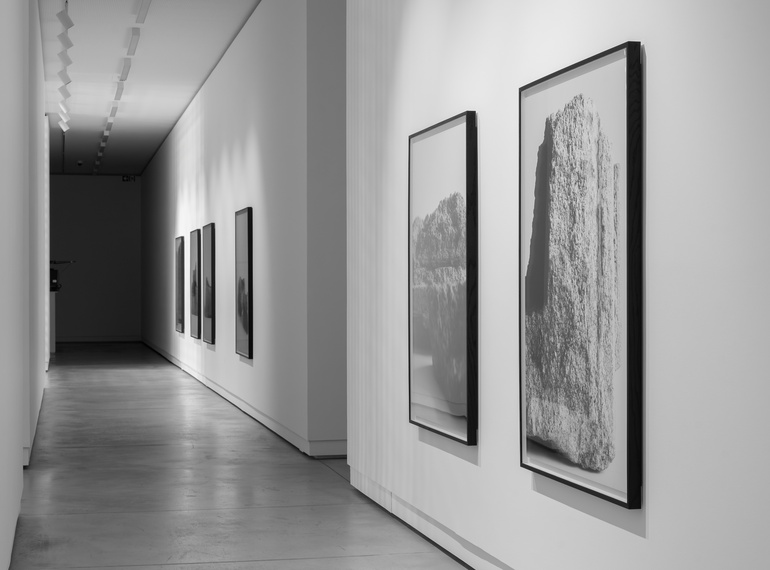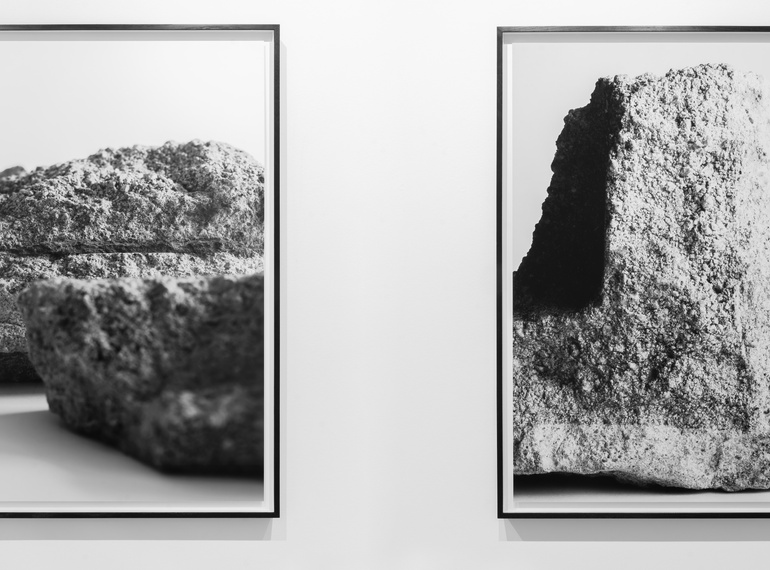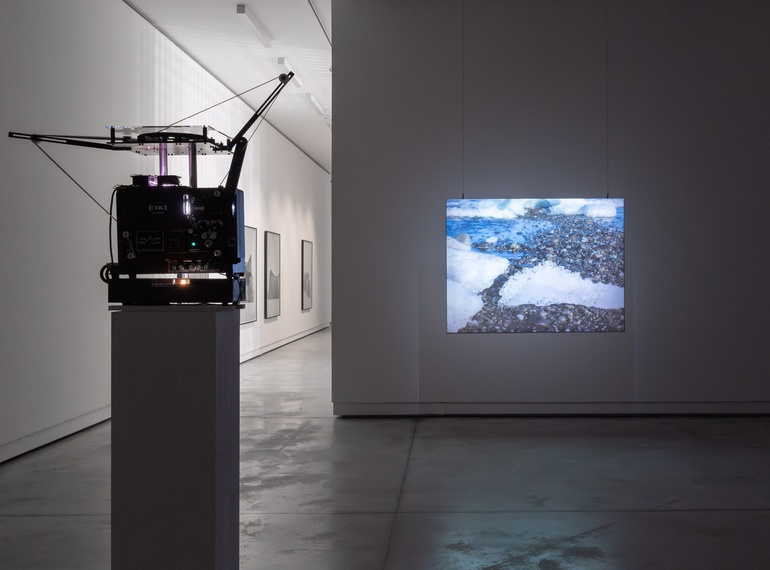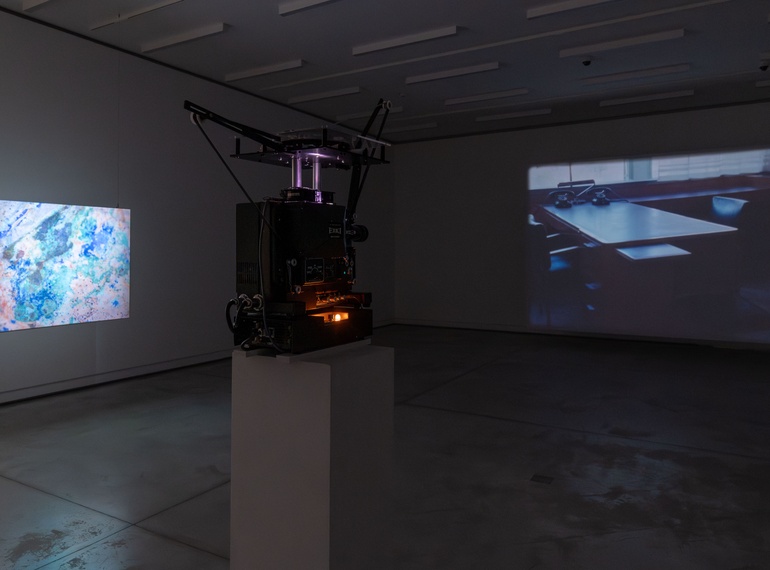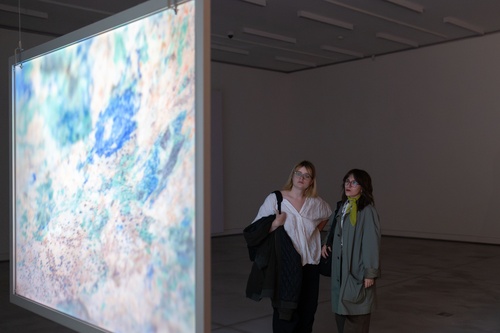Dorit Margreiter Choy
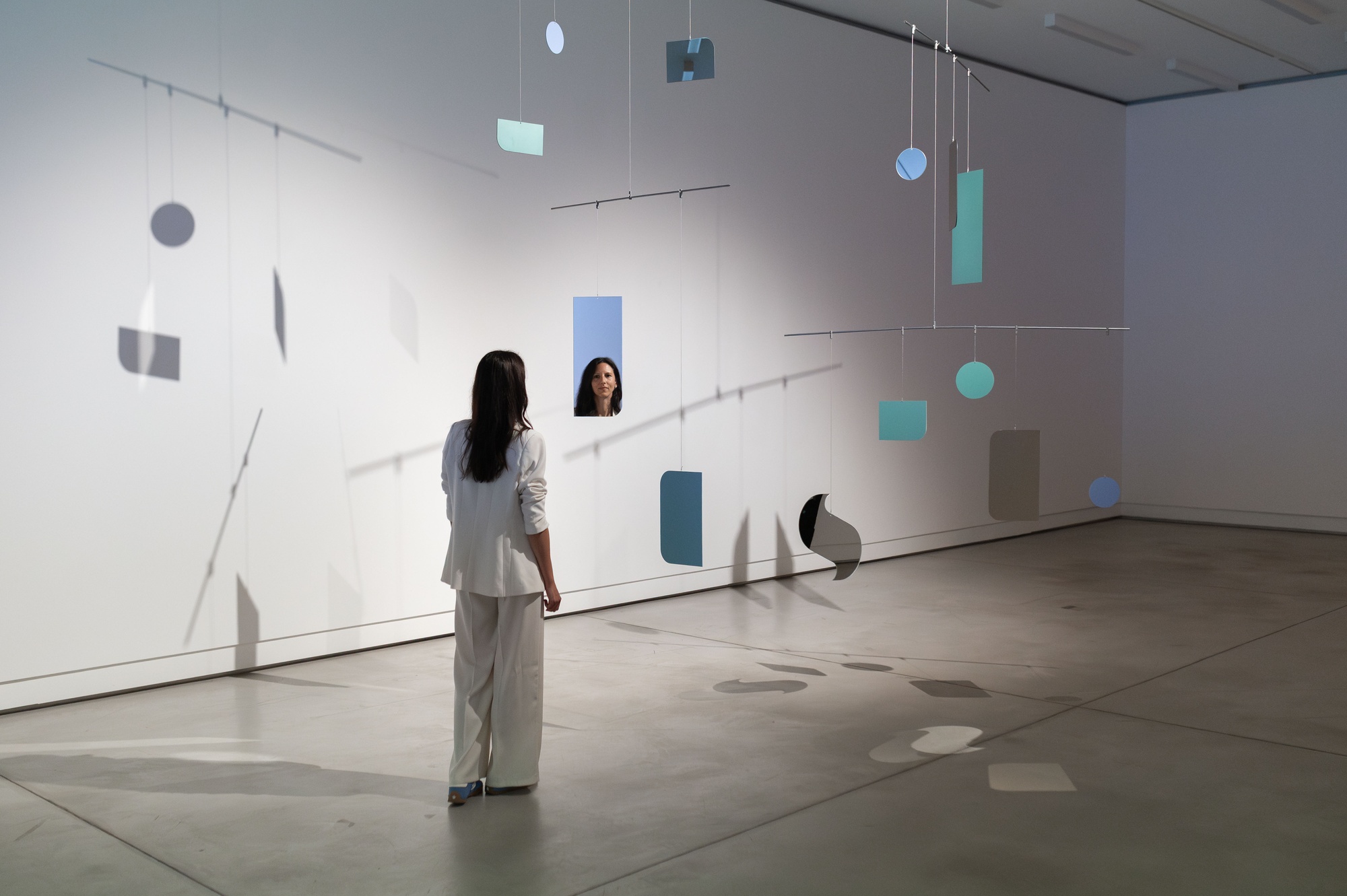
Dorit Margreiter Choy’s exhibition Passage presents a selection of interrelated works – films, mobiles, and photographs – that examine architecture and space in terms of their inscriptions of power, economy, and gender roles.
Dorit Margreiter Choy is an Austrian artist whose work explores modern architecture, its ideological influence, and its connections to economics and gender roles. Through her films, photographs, and objects, she narrates the stories of places and landscapes in transformation, with humans playing an implicit role as architects of these changes. The works presented at Cukrarna Gallery, with their focus on local histories, find both conceptual and material resonance within the gallery’s environment.
The films shown in the exhibition explore topics such as a company building in Zlín, Czech Republic, a former silver mine in Schwaz, Tyrol, and the Austrian Pavilion, designed by Josef Hoffmann, in the Venice Biennale’s Giardini. Taking these material testimonies to global history, Margreiter Choy looks at the relationship between history and the present as well as between reality and representation. She transforms her visual material into micro-histories of extractivism, imperial symbolism, and global financial flows, embodied in architecture and landscapes. Her films thus offer focused perspectives on these remnants, highlighting their contradictions, consequences, and influence on the present.
After the First World War, a new district was built in Zlín, with a shopping centre, communal buildings, and 2,000 small houses for workers. It was the headquarters of Bata, a shoe manufacturer and global corporation of the 20th century. As early as 1932, Bata employed 31,000 people worldwide and produced 36 million shoes per year, which were sold in 2,500 Bata stores from Chicago to Singapore. At the end of the 1930s, when the company reached its economic peak, a new high-rise with a 77-metre-high tower was erected in Zlín. An elevator in the tower’s centre served as CEO Tomas Bata’s office, fully equipped with a desk, telephone, heating, and air conditioning – a miniature headquarters for his global trade imperium. In her 16mm film B21 (Director’s Office), Margreiter Choy presents the moving office in eight shots that conceptualise the building’s ideology of control and imperial outreach: the film strip is 77 metres long, which equals the tower’s height.
A second 16mm film, Silber (Silver), dives deeper into the formative era of globalised capitalism. The camera follows cuboid ice that breaks off from the Vatnajökull glacier, slides down into the valley, and slowly melts on a black lava beach. Images from the Tyrolean town of Schwaz, a central location of European silver mining, are superimposed on this scenery of flowing matter. Around 1520, more than 50,000 people were employed in the mines. The Tyrolean sovereign had his own coins produced and increased production for international export. The silver taler thus became a global means of payment. The Habsburgs, in turn, began to lease their rights to mine and sell the silver extracted to private entrepreneurs such as the Fuggers. It became common for entrepreneurs and traders to sell metal that had not yet been mined for bills of exchange or cash payment – trading in what we call today derivatives began. Large lumps of stone interspersed with silver veins overlay the images of the melting Icelandic glacier and point to the effects of the capital-driven Anthropocene.
The video Pavilion, created when Dorit Margreiter Choy represented Austria at the 2009 Venice Biennale, turns to architecture as a site of fragmented historical events and memories of past, often forgotten, moments. The iconic building of the Austrian Pavilion, itself an empty shell, is brought to life by the ideology and politics of the country it is meant to represent. Its architecture serves both as a backdrop for its own narrative and as a series of undefined moments – between rehearsal and performance, editing, movement, and space – revealing things and events that converge in the personal experience of the present historical moment.
In the photographic series Bearing Masonry, Concrete Block (1923), the films find a static complement. A crumbled piece of concrete from the façade of the Ennis Brown House in Los Angeles, an architectural icon of Frank Lloyd Wright’s modernist Mayan Revival style, is blown-up. The building, with its distinctive concrete ornamentation, which served as a film set for numerous Hollywood productions, including Ridley Scott’s Blade Runner, was destroyed by an earthquake in 1992 and later rebuilt. In Margreiter Choy’s two-dimensional image of the original piece of concrete, a fragment of reality becomes a metonym for the historys encapsulated in the abandoned building.
In their juxtaposition and coexistence, all the works in the exhibition address the relationship between material erasure, preservation, and activation of the past. A large mobile connecting the works is composed of letters that form the word “passage”. This passage describes an essential characteristic of the exhibition space at Cukrarna Gallery, but also alludes to Walter Benjamin’s Arcades Project: as an analysis of the present along vanishing points of history.
Curated by Vanessa Joan Müller
Production and coordination: Janja Buzečan; Public relations: Mojca Podlesek; Educational and andragogical programme: Nina Vošnjak; Design: Ajdin Bašić, Špela Razpotnik; Technical crew: Jože Kalan, Zvone Sečnik, Martin Lovšin, Bert Prelec. We thank the following for the loan of works: Studio Dorit Margreiter Choy, Charim Galerie. Supported by: City of Ljubljana, Österreichisches Kulturforum Laibach

Opening hours
Tuesday to Sunday: 10.00–19.00
Tickets
Adults: 8 €
Students, retirees, visitors with disabilities: 6 €
Family ticket: 18 €
Admission free: children 7 and under, ICOM, PRESS *
*The ticket includes access to the exhibition Razstava (second floor) and the exhibition Passage (first floor).
